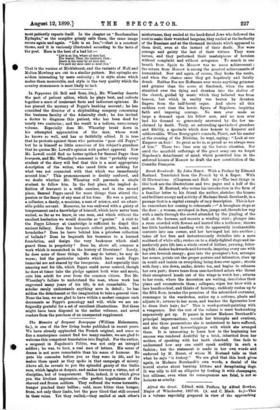Mr. William Andrews in his Curious Epitaphs (Andrews,7s. 6d.) has
collected a goodly number of lapidary inscriptions. But the book is of no great value, since its compiler has been led away by an irrelevant jocosity. Now, many an excellent man has been driven to jest in the presence of death by a sort of solemn per- versity, but this perversity is seldom admirable when cut on stone. Severity is as imperative to an epitaph as concision, and to gather specimens of graveyard humour is as thankless a task as to collect puns. Not even the epitaph of old Hobson, the carrier, which, as Mr. Andrews should know, is the work of Milton, is worthy its author or the occasion. Indeed, the best excuse for the most of them is that they were written by village poets, and in accordance with an ancient, if misguided, super- stition. Mr. Andrews by adopting a simple, illogical classifica- tion has at least demonstrated one truth, that the popo'..r fanoy
most patiently repeats itself. In the chapter on "Bacchanalian Epitaphs," as the compiler grimly calls them, the same image recurs again and again. "Life is an Inn,"—that is a constant theme, and it is variously illustrated according to the taste of the poet. Here is the best of a bad lot :—
" Life is an Inn, where all men bait, The waiter, Time, the landlord, Fate ; Death la the score by all men due, I've paid my shot—and so must you."
That is the version at Micklehluet, and the variants of Hull and Melton Mowbray are cut to a similar pattern. But epitaphs are seldom interesting by mere curiosity ; it is style alone which makes them memorable, and style is the very quality which the country stonemason is most likely to lack



































 Previous page
Previous page